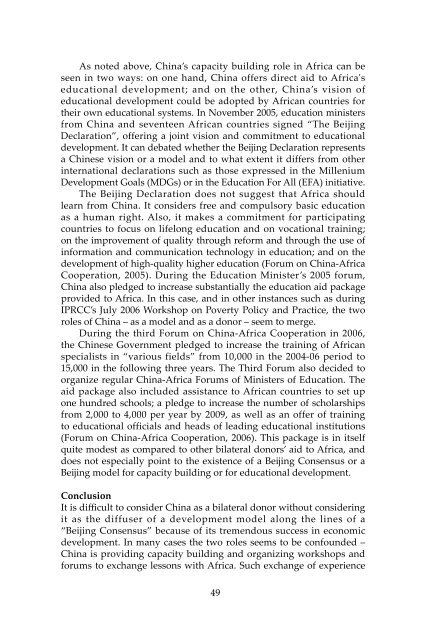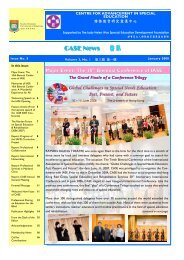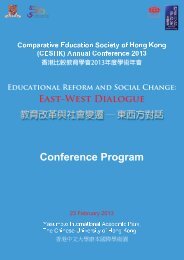Comparative Education Bulletin - Faculty of Education - The ...
Comparative Education Bulletin - Faculty of Education - The ...
Comparative Education Bulletin - Faculty of Education - The ...
Create successful ePaper yourself
Turn your PDF publications into a flip-book with our unique Google optimized e-Paper software.
As noted above, China’s capacity building role in Africa can be<br />
seen in two ways: on one hand, China <strong>of</strong>fers direct aid to Africa's<br />
educational development; and on the other, China’s vision <strong>of</strong><br />
educational development could be adopted by African countries for<br />
their own educational systems. In November 2005, education ministers<br />
from China and seventeen African countries signed “<strong>The</strong> Beijing<br />
Declaration”, <strong>of</strong>fering a joint vision and commitment to educational<br />
development. It can debated whether the Beijing Declaration represents<br />
a Chinese vision or a model and to what extent it differs from other<br />
international declarations such as those expressed in the Millenium<br />
Development Goals (MDGs) or in the <strong>Education</strong> For All (EFA) initiative.<br />
<strong>The</strong> Beijing Declaration does not suggest that Africa should<br />
learn from China. It considers free and compulsory basic education<br />
as a human right. Also, it makes a commitment for participating<br />
countries to focus on lifelong education and on vocational training;<br />
on the improvement <strong>of</strong> quality through reform and through the use <strong>of</strong><br />
information and communication technology in education; and on the<br />
development <strong>of</strong> high-quality higher education (Forum on China-Africa<br />
Cooperation, 2005). During the <strong>Education</strong> Minister’s 2005 forum,<br />
China also pledged to increase substantially the education aid package<br />
provided to Africa. In this case, and in other instances such as during<br />
IPRCC’s July 2006 Workshop on Poverty Policy and Practice, the two<br />
roles <strong>of</strong> China – as a model and as a donor – seem to merge.<br />
During the third Forum on China-Africa Cooperation in 2006,<br />
the Chinese Government pledged to increase the training <strong>of</strong> African<br />
specialists in “various fields” from 10,000 in the 2004-06 period to<br />
15,000 in the following three years. <strong>The</strong> Third Forum also decided to<br />
organize regular China-Africa Forums <strong>of</strong> Ministers <strong>of</strong> <strong>Education</strong>. <strong>The</strong><br />
aid package also included assistance to African countries to set up<br />
one hundred schools; a pledge to increase the number <strong>of</strong> scholarships<br />
from 2,000 to 4,000 per year by 2009, as well as an <strong>of</strong>fer <strong>of</strong> training<br />
to educational <strong>of</strong>ficials and heads <strong>of</strong> leading educational institutions<br />
(Forum on China-Africa Cooperation, 2006). This package is in itself<br />
quite modest as compared to other bilateral donors’ aid to Africa, and<br />
does not especially point to the existence <strong>of</strong> a Beijing Consensus or a<br />
Beijing model for capacity building or for educational development.<br />
Conclusion<br />
It is difficult to consider China as a bilateral donor without considering<br />
it as the diffuser <strong>of</strong> a development model along the lines <strong>of</strong> a<br />
“Beijing Consensus” because <strong>of</strong> its tremendous success in economic<br />
development. In many cases the two roles seems to be confounded –<br />
China is providing capacity building and organizing workshops and<br />
forums to exchange lessons with Africa. Such exchange <strong>of</strong> experience<br />
49
















